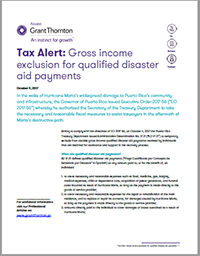-
Financial statements audits
Financial statement audits
-
Compliance audits
Compliance audits
-
Compilations and reviews
Compilations and audit
-
Agreed-upon procedures
Agreed-upon procedures
-
Corporate and business tax
Our trusted teams can prepare corporate tax files and ruling requests, support you with deferrals, accounting procedures and legitimate tax benefits.
-
International tax
Our teams have in-depth knowledge of the relationship between domestic and international tax laws.
-
Tax compliance
Business Tax
-
Individual taxes
Individual taxes
-
Estate and succession planning
Estate and succession planning
-
Global mobility services
Through our global organisation of member firms, we support both companies and individuals, providing insightful solutions to minimise the tax burden for both parties.
-
Sales and use tax and indirect taxes
SUT/ VAT & indirect taxes
-
Tax incentives program
Tax incentives program
-
Transfer Pricing Study
The laws surrounding transfer pricing are becoming ever more complex, as tax affairs of multinational companies are facing scrutiny from media, regulators and the public
-
Business consulting
Our business consulting services can help you improve your operational performance and productivity, adding value throughout your growth life cycle.
-
Forensic and investigative services
At Grant Thornton, we have a wealth of knowledge in forensic services and can support you with issues such as dispute resolution, fraud and insurance claims.
-
Fraud and investigations
The commercial landscape is changing fast. An ever more regulated environment means organizations today must adopt stringent governance and compliance processes. As business has become global, organizations need to adapt to deal with multi-jurisdictional investigations, litigation, and dispute resolution, address the threat of cyber-attack and at the same time protect the organization’s value.
-
Dispute resolutions
Our independent experts are experienced in advising on civil and criminal matters involving contract breaches, partnership disputes, auditor negligence, shareholder disputes and company valuations, disputes for corporates, the public sector and individuals. We act in all forms of dispute resolution, including litigation, arbitration, and mediation.
-
Business risk services
We can help you identify, understand and manage potential risks to safeguard your business and comply with regulatory requirements.
-
Internal audit
We work with our clients to assess their corporate level risk, identify areas of greatest risk and develop appropriate work plans and audit programs to mitigate these risks.
-
Service organization reports
As a service organization, you know how important it is to produce a report for your customers and their auditors that instills confidence and enhances their trust in your services. Grant Thornton Advisory professionals can help you determine which report(s) will satisfy your customers’ needs and provide relevant information to your customers and customers’ auditors that will be a business benefit to you.
-
Transaction advisory services
Transactions are significant events in the life of a business – a successful deal that can have a lasting impact on the future shape of the organizations involved. Because the stakes are high for both buyers and sellers, experience, determination and pragmatism are required to bring deals safely through to conclusion.
-
Mergers and acquisitions
Globalization and company growth ambitions are driving an increase in M&A activity worldwide as businesses look to establish a footprint in countries beyond their own. Even within their own regions, many businesses feel the pressure to acquire in order to establish a strategic presence in new markets, such as those being created by rapid technological innovation.
-
Valuations
We can support you throughout the transaction process – helping achieve the best possible outcome at the point of the transaction and in the longer term.
-
Recovery and reorganization
We provide a wide range of services to recovery and reorganisation professionals, companies and their stakeholders.
In the wake of Hurricane Maria’s widespread damage to Puerto Rico’s community and infrastructure, the Governor of Puerto Rico issued Executive Order 2017-56 (“EO 2017-56”) whereby he authorized the Secretary of the Treasury Department to take the necessary and reasonable fiscal measures to assist taxpayers in the aftermath of Maria’s destructive path.
Aiming to comply with the directives of EO 2017-56, on October 4, 2017 the Puerto Rico Treasury Department issued Administrative Determination No. 17-21 (“AD 17-21”) to temporary exclude from taxable gross income qualified disaster aid payments received by individuals that are destined for assistance and support in the recovery process.
What are qualified disaster aid payments?
AD 17-21 defines qualified disaster aid payments (“Pago Cualificado por Concepto de Asistencia por Desastre” in Spanish) as any amount paid to, or for the benefit of, an individual:
- to cover necessary and reasonable expenses such as food, medicine, gas, lodging, medical expenses, child or dependents care, acquisition of power generators, and funeral costs incurred as result of Hurricane Maria, so long as the payment is made directly to the goods or service provider;
- to cover necessary and reasonable expenses for the repair or rehabilitation of the main residence, and to replace or repair its contents, for damages caused by Hurricane Maria, so long as the payment is made directly to the goods or service provider;
- amounts directly paid to the individual to cover damages or losses sustained as a result of Hurricane Maria;
- amounts paid by federal, state, local governments or agencies as a result of Hurricane Maria for the general benefit and well-being of the population.
For qualified disaster aid payments to benefit from the preferential (albeit temporary) gross income exclusion, they must comply with the following requirements:
- payments must be made to the individuals between September 21, 2017 and December 31, 2017;
- payments must be in lieu of the salary or compensation that was not earned during the time the individual was not able to work due to the emergency;
- in the case of payments made by employers to its employees, the payment must:
- i. be in addition to the employees’ ordinary salary or compensation;
- ii. not discriminate in favor of highly compensated employees; and
- iii. not exceed $1,000 per month.
Every employer that makes qualified disaster aid payments must file on or before January 31, 2018 a Sworn Statement with the name, social security number and amount paid of every employee to whom a payment was made. The employer must also report these payments as exempt income in the corresponding Withholding Form.
Compliance with AD17-21 dispositions will allow the employer to claim qualified disaster aid payments as deductible expenses for income tax purposes.
No Interest Loans to Employees
Any employer that, in addition to the aforementioned qualified disaster aid payments, offers zero-interest loans, not exceeding $20,000, to employees for the latter to cover necessary and reasonable expenses for to damages or losses related to Hurricane Maria, will not need to recognize any income on said loan.
Note: As highlighted in our Tax Alert dated July 1, 2016, the Puerto Rico Oversight, Management, and Economic Stability Act (PROMESA), seeks to provide Puerto Rico with fiscal and economic discipline through the creation of a control board, among other things. Virtually every fiscal decision by the Government of Puerto Rico will be made or approved by the Oversight Board created by PROMESA. On this regard, the board has authority to prevent the execution or enforcement of a contract, rule, executive order or regulation to the extent that it is inconsistent with the approved fiscal plan.


